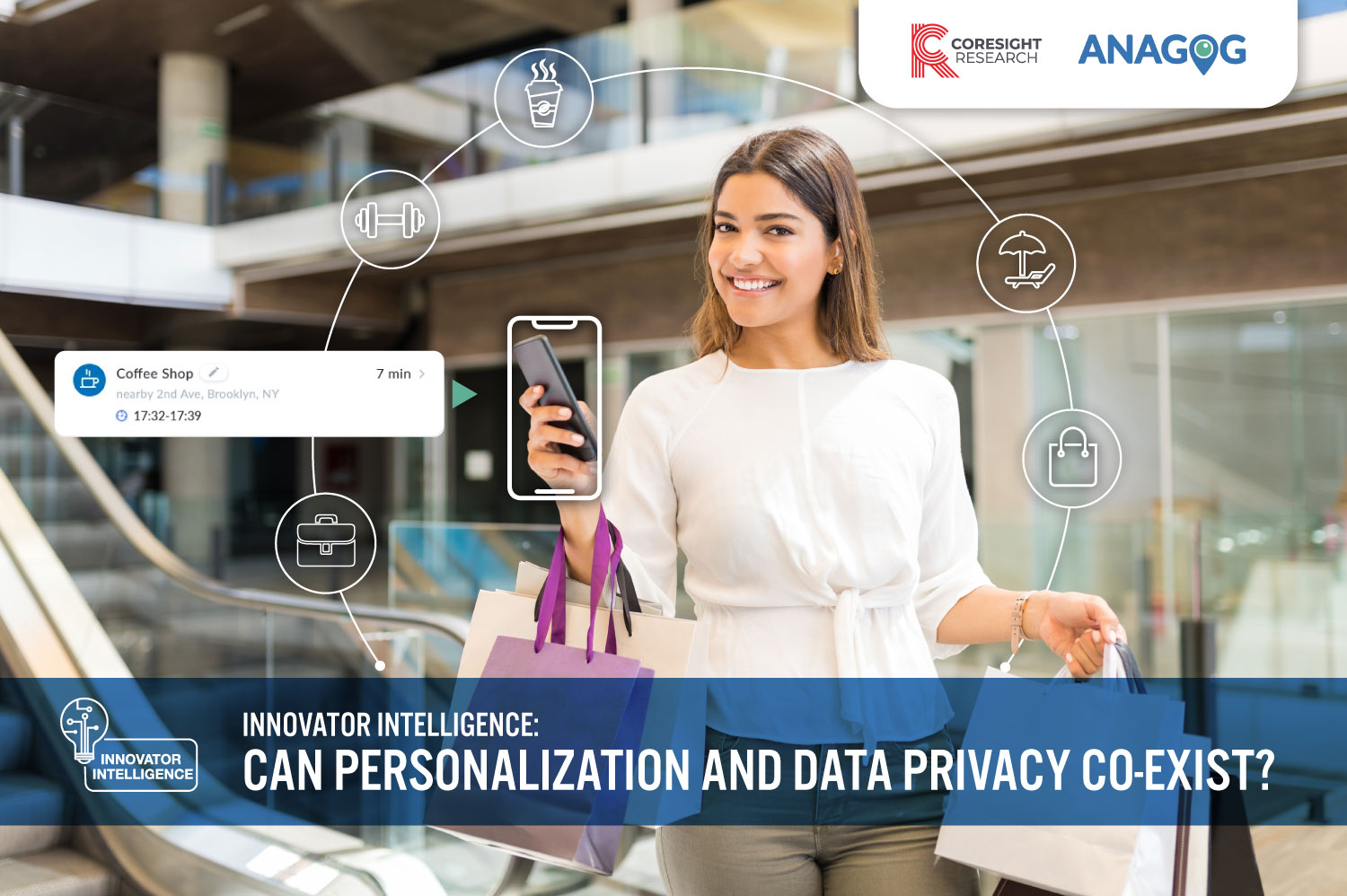
DIpil Das
Introduction
Today’s consumer is more informed, advanced and connected than ever before. Not only has the shopping journey undergone complete transformation, so have the touchpoints through which customers interact with brands and retailers. As a result, consumer expectations have changed—they now demand consistent, seamless and, most importantly, tailor-made experiences. Unsurprisingly, 93% of consumers agree it is important that every interaction they have with a brand is “excellent,” according to an October 2019 survey of 8,000 consumers across Europe and North America conducted by Accenture. Personalization is key to increasing sales, engagement and retention, and it therefore has a direct impact on revenues and profitability—78% of businesses that have a full or partial personalization strategy experienced revenue growth in 2018, according to a 2019 survey of 607 marketers across Europe and North America conducted by Worldwide Business Research (WBR). However, effective personalization is not as simple as it may seem, primarily due to reliance on incorrect and in some cases inadequate customer data. For example, personalized recommendations can be ineffective if they are based solely on a customer’s online interactions and previous shopping history with a brand or retailer, as there is so much about that consumer’s real life and preferences that are not being taken into account. To offer effective personalization, it is necessary for retailers to collect in-depth behavioral data—primarily offline—about the customer and merge it with the data that is available through online sources. Furthermore, the importance of physical stores in the shopping journey mean that it is critical for companies to collect offline data. In the Coresight Research Holiday 2019 US Shopper Survey, we found that brick-and-mortar locations were the most preferred channel by consumers to research holiday gifts, with seven in 10 US shoppers citing physical stores as their preferred source for comparing products and prices or simply to find gifting inspiration. This report forms part of our Innovator Intelligence series, which focuses on emerging companies that are disrupting retail and fueling innovation across the retail value chain. In this report, we examine Anagog, a smartphone-based AI engine and marketing platform provider that enables businesses to make personalized offers based on their customers’ real-world behavior in real time, while keeping user data secure on smartphones. This means that users can receive personal and contextual offerings even when they decide not to share personal data from their phones. We also discuss key industry trends and market pitfalls in the context of personalization.Personalization and Hyper-Personalization: Understanding Industry Practices
What Is Hyper-Personalization? Hyper-personalization is a marketing strategy that involves user-specific engagement based on a thorough understanding of each individual, using both offline and online data. Based on this information, businesses can employ data-driven contextual marketing to provide shoppers with personalized recommendations on products, services and content at the right time and place. Have Businesses Been Able To Offer Effective Personalization? Although most companies understand the importance of personalization, many have not been able to implement it effectively. Only 12% of marketers were “very” or “extremely” satisfied with the level of personalization in their marketing efforts, according to a 2018 survey of 300 global marketers conducted by software company Evergage. Poor data is one of the key obstacles to implementing effective personalization: Although data is generated through many sources, organizations often lack the adequate data infrastructure to interpret it, which leads to ineffective personalization. What Do Consumers Expect from Personalization? Consumers expect personalization to offer relevant and consistent experiences across online and offline channels in the shopping journey. They want brands and retailers to identify their tastes and requirements when sending personalized offers. In other words, shoppers want personalized campaigns to mimic the intelligence of a salesperson who is familiar to them. The majority of consumers appear to be willing to share their personal data if they receive value in return—54% of customers would allow retailers to access their personal information in exchange for personalized offers, according to a 2018 survey of 3,000 respondents in Canada, the the US and UK, conducted by software company RedPoint Global. At the same time, transparency is very important to consumers, with 74% of survey respondents stating that it is “very important” or “absolutely essential” that brands inform their customers about what information is being collected. It is also important that consumers are made aware if their data is shared with any third party.Industry Overview
Retail Customer Retention Is Poor in Its Current State In digital retail, customer acquisition is often in the spotlight, given the high marketing costs typically faced by online-only retailers. However, the other side of the same coin is customer retention—and with increased competition have come higher rates of customer churn. The increasingly complex shopping journey—which now incorporates online and offline research, e-commerce and social media—has only compounded the problem of customer retention, primarily due to the abundance of available choice. According to a study by software-as-a-service provider CustomerGauge, the customer retention rate in the retail industry was 63% in 2018—the second lowest across the industries that the company surveyed. [caption id="attachment_105328" align="aligncenter" width="700"]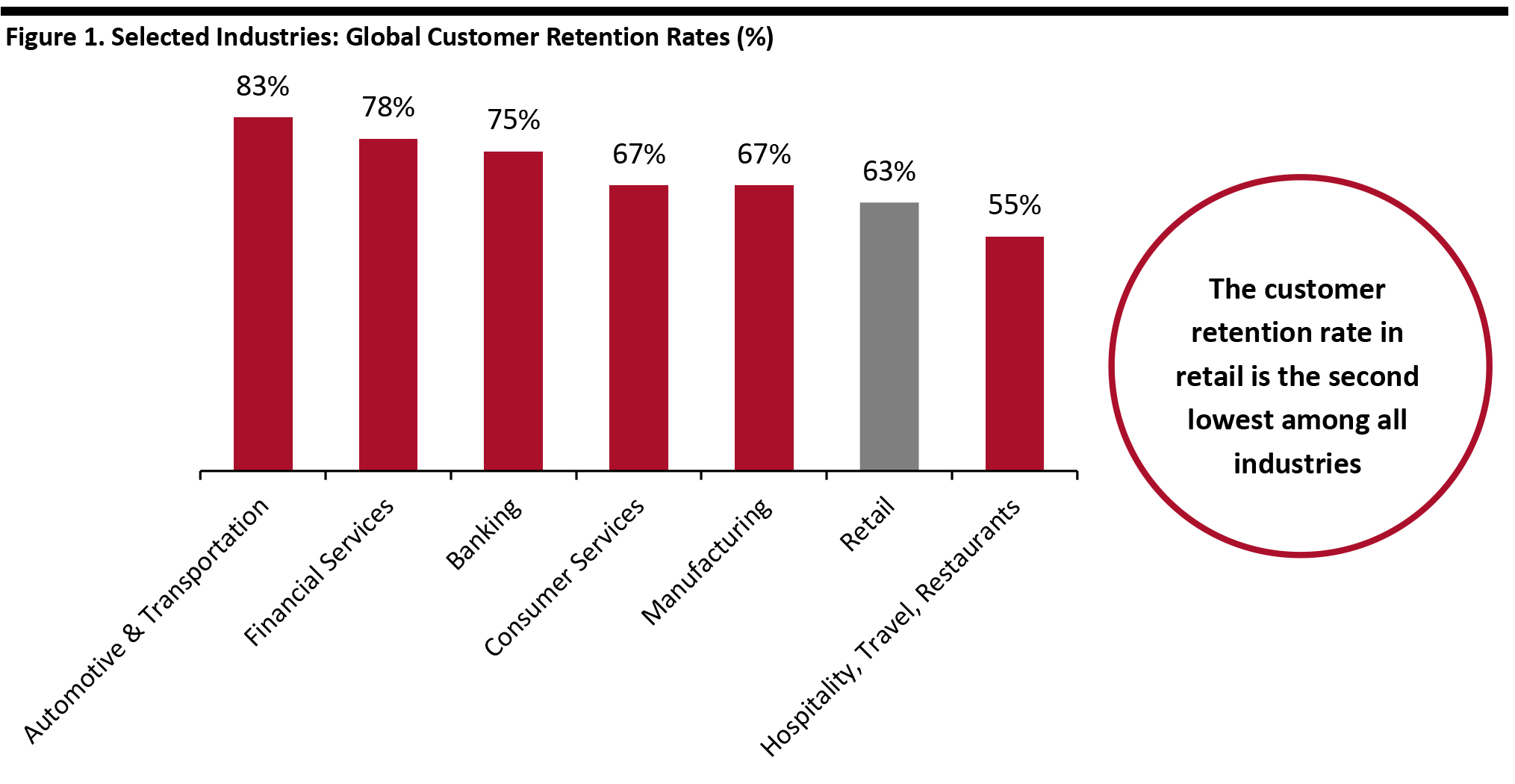 Base: 468 global respondents from business-to-business and business-to-consumer markets
Base: 468 global respondents from business-to-business and business-to-consumer markets Source: CustomerGauge [/caption] In fact, the industries that showed the highest retention rates—automotive and transportation and financial services—have often underlined the importance of consumer experience in achieving customer retention. For example, in a 2018 survey of 439 global respondents conducted by Adobe, 41% of respondents from the financial services and insurance industry cited real-time personalization as the “most exciting” prospect in the coming three years. Data Unification and Interpretation Remain Key Challenges Data interpretation is an essential element of successful marketing campaigns and personalization efforts. Brands and retailers have access to growing amounts of consumer data as shoppers engage with brands through multiple channels. To gain a competitive advantage, businesses must harness the available data and build meaningful personalized campaigns around it. Many companies understand the changing nature of data generation, and as such, they are tapping multiple data sources, such as email open rates, web searches, order history and demography. In fact, the median number of sources used by marketing organizations increased to 15 in 2019 from 10 in 2017, according to Salesforce. In any case, a higher number of data sources does not necessarily imply better personalization. While retailers do recognize the potential of personalization to drive sales, they face challenges in building a sustainable data architecture—which is necessary for the unification and interpretation of data. In fact, 30% of survey respondents from the retail industry stated that building a sustainable data architecture is their primary obstacle to personalization, according to a December 2018 survey of 607 marketers conducted by WBR and software company Monetate. Other key challenges include integrating third-party data and accessing high-quality data. [caption id="attachment_105329" align="aligncenter" width="700"]
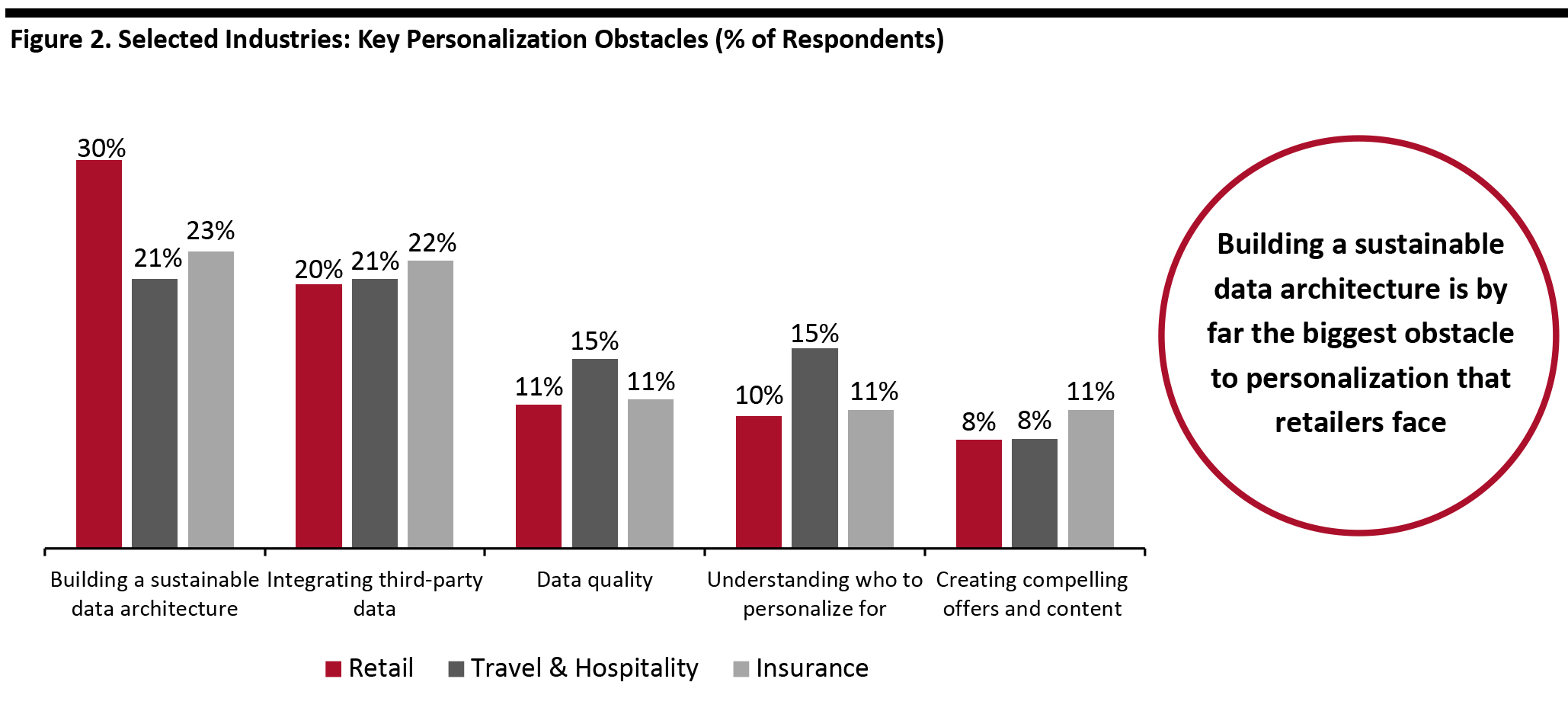 Base: 607 marketers across Europe and North America
Base: 607 marketers across Europe and North America Source: WBR/Monetate [/caption] Data Privacy Needs Addressing in Many Ways Among the themes that have recently emerged in the context of data privacy, transparency is critical. It is underlined by the General Data Protection Regulation (GDPR), which regulates data protection and privacy in the European Union, and the California Consumer Privacy Act in the US. These regulations make it mandatory for companies to obtain consent from their customers if they wish to collect and use personal data. However, company privacy policy documents can be quite lengthy and difficult for shoppers to understand. For example, Under Armour’s latest privacy policy is over 8,500 words in length, which most customers may not read fully. Brands and retailers need to be wary that even the slightest misjudgment could put their company at the center of negative publicity. Consumer consent and transparency need to simultaneously exist in order to build trust among consumers. In addition, an organization’s data architecture must be compliant with current regulations, and customers should be made fully aware of this. It is important to understand that brands and retailers should not rely on regulations alone to set their policies. For example, GDPR does not restrict businesses from having access to the microphones on consumers’ mobile phones for voice assistants. However, according to an October 2019 survey of 8,000 consumers conducted by Accenture, seven in 10 customers stated that receiving an ad for something that they talked about near a voice assistant, but never searched for, is the “creepiest advertising technique.” Despite increasing data privacy concerns and the emergence of stricter data privacy laws, consumers are willing to trade their personal data in return for transparency and enhanced personalization. The Accenture survey found that 73% of consumers are willing to share more personal information in exchange for better transparency and value. This implies that brands and retailers not only need to ensure compliance but also that they are providing customers with added value in exchange for their personal information. Shoppers Are Impulsive and Impatient E-commerce has spoiled shoppers with nearly unlimited product choice and rapid delivery. Online marketplaces and retailers such as Amazon have invested large amounts of money in building logistics services that deliver products faster. With its Prime Now offering, Amazon enables customers in the US to receive grocery deliveries within two hours of placing an order. As a result, shoppers have higher expectations of immediacy. This more impulsive and impatient consumer nature suggests that personalization now has greater potential to drive incremental sales, provided that retailers and brands target customers with the right messages at the right time and place. Below, we chart the Prosper Impulsivity Score from Prosper Insights & Analytics, which indicates how much or how little consumers are living in the moment when it comes to their spending habits. This measure of shopper impulsivity is based on monthly surveys that ask consumers to what extent they agree with the statement, “Live for today because tomorrow is so uncertain.” [caption id="attachment_105330" align="aligncenter" width="700"]
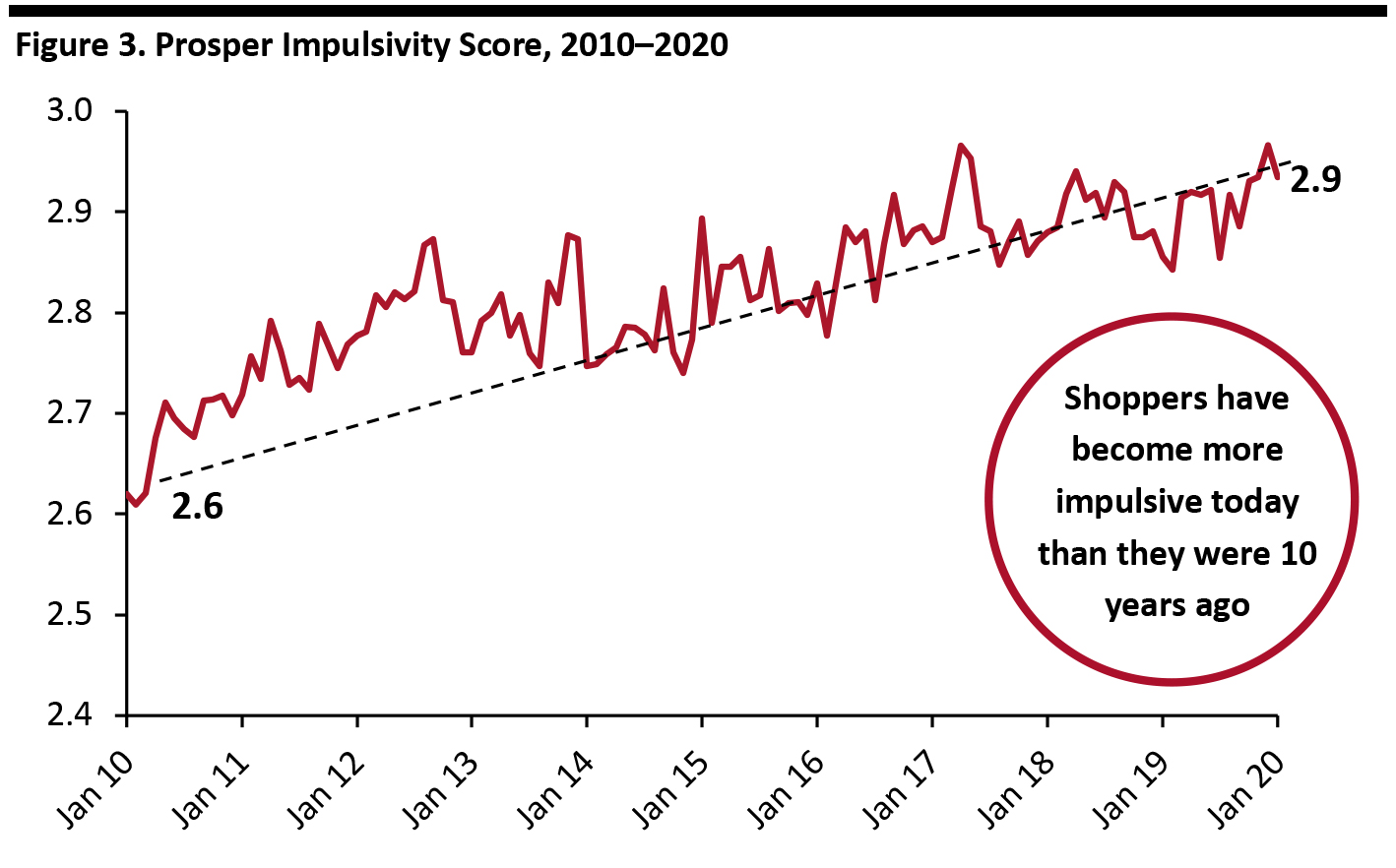 The Prosper Impulsivity Score is calculated using a weighted average based on a five-point scale: The closer the score is to five, the more consumers agree with the statement, “Live for today because tomorrow is so uncertain;” and the closer the score is to one, the more they disagree.
The Prosper Impulsivity Score is calculated using a weighted average based on a five-point scale: The closer the score is to five, the more consumers agree with the statement, “Live for today because tomorrow is so uncertain;” and the closer the score is to one, the more they disagree. Source: Prosper Insights & Analytics/Coresight Research [/caption] Conventional Promotional Strategies Have Limited Impact Nontargeted promotional strategies often have a limited impact on shopper’s buying decisions. This is due to a number of factors, such as incorrect target audience, limited visibility and limited value to the buyer. Below, we chart the Prosper Promotional Influence Score from Prosper Insights & Analytics, which indicates how much influence a specific promotion has on the buying decisions of shoppers. As shown in Figure, very few promotional campaigns have a positive impact on consumer purchasing decisions. [caption id="attachment_105369" align="aligncenter" width="700"]
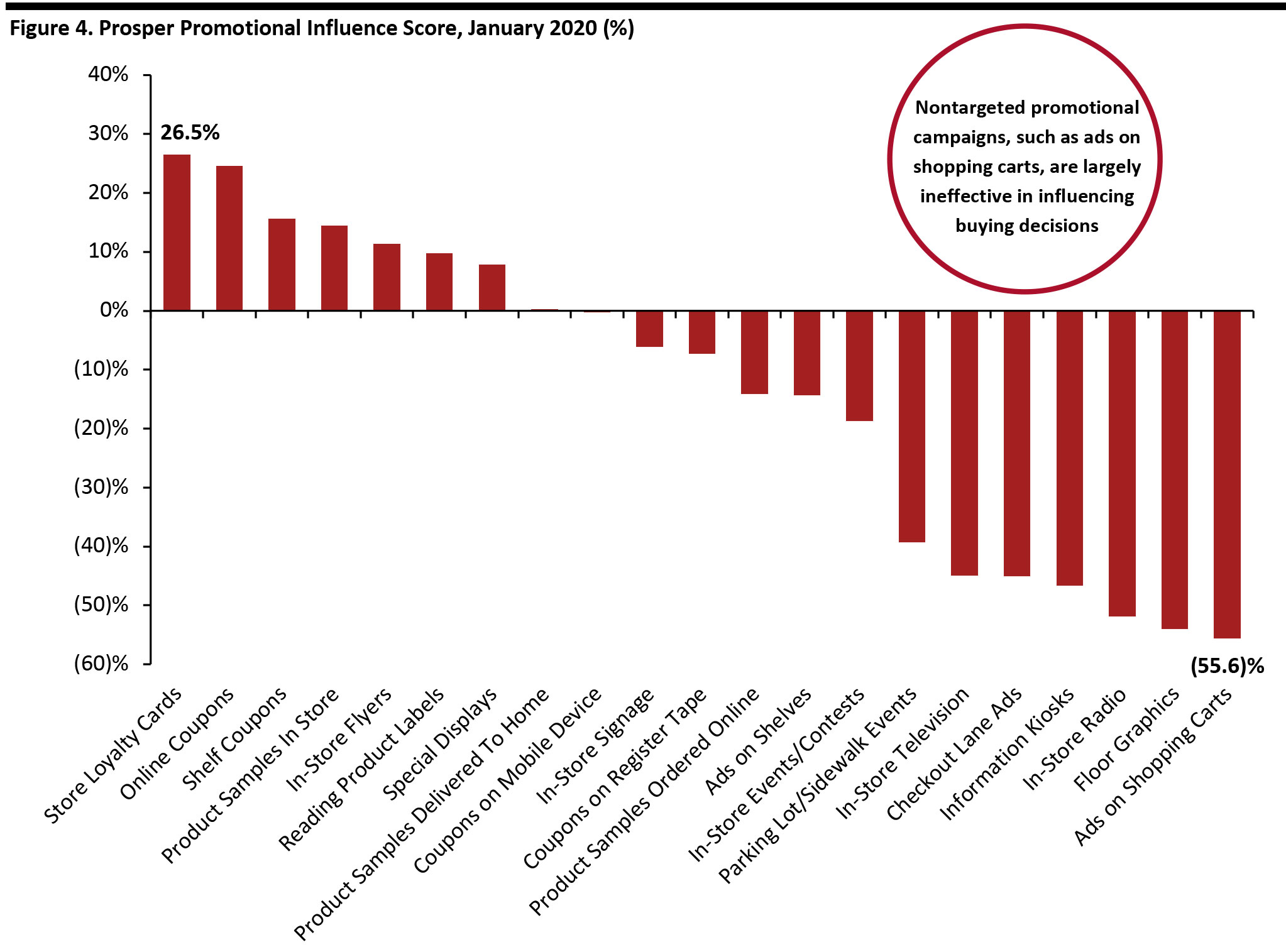 The Prosper Promotional Influence Score is calculated by subtracting the sum of the percentage of respondents who indicated one and two on the five-point scale from the sum of the percentage of respondents who indicated four and five on the five-point scale—where one means “no influence” and five means “great influence.”
The Prosper Promotional Influence Score is calculated by subtracting the sum of the percentage of respondents who indicated one and two on the five-point scale from the sum of the percentage of respondents who indicated four and five on the five-point scale—where one means “no influence” and five means “great influence.” Source: Prosper Insights & Analytics/Coresight Research [/caption] Furthermore, from a financial standpoint, some nontargeted promotions might not be as effective as they may seem, in part because of issues related to attribution: It can often be difficult for retailers to identify which promotions are working when multiple marketing campaigns and offers are running simultaneously. It is essential for marketers to provide shoppers with personalized promotions in order to have an impact on purchasing behaviors, which can be achieved by leveraging AI capabilities. Personalized promotions reduce marketing costs and target the right consumer, which increases the efficacy of the promotion and thus drives sales.
Anagog: Company Overview and Solutions for Retailers
Anagog offers on-device AI technology that enables companies to use smartphones as AI data engines on which they can analyze data locally. Anagog’s patented technology creates a user profile on the smartphone by interpreting information from the device’s various sensors. This profile can provide insights about the individual consumer’s behavior in the physical world, related to their lifestyle, life events and typical daily routine. Together with the real-time location and activity data, this information allows retailers to create hyper-personalized and contextualized offers without having to upload the customer’s personal information to a remote cloud. Anagog is addressing key market restraints such as non-efficient data architecture and inconsistent consumer experience across channels. Anagog’s offering comprises two main components:- JedAI SDK is on-device AI technology software that is integrated into any existing mobile app through an application programming interface, and it is available for both iOS and Android devices. JedAI SDK leverages the sensors on a smartphone to collect and process data about the user. Each user can manage their own personal information, which is stored only on the phone itself.
- JedAI Marketing Assistant (JEMA) is a new, on-device marketing platform that is integrated with JedAI SDK and will be available from the second quarter of 2020. JEMA can receive and store predefined marketing rules about what offer to make to at what time and place, based on the user’s characteristics. These marketing rules are located on the phone instead of the cloud and enables retailers to leverage information about the user’s behavior and location in real time to ensure that promotions are relevant.
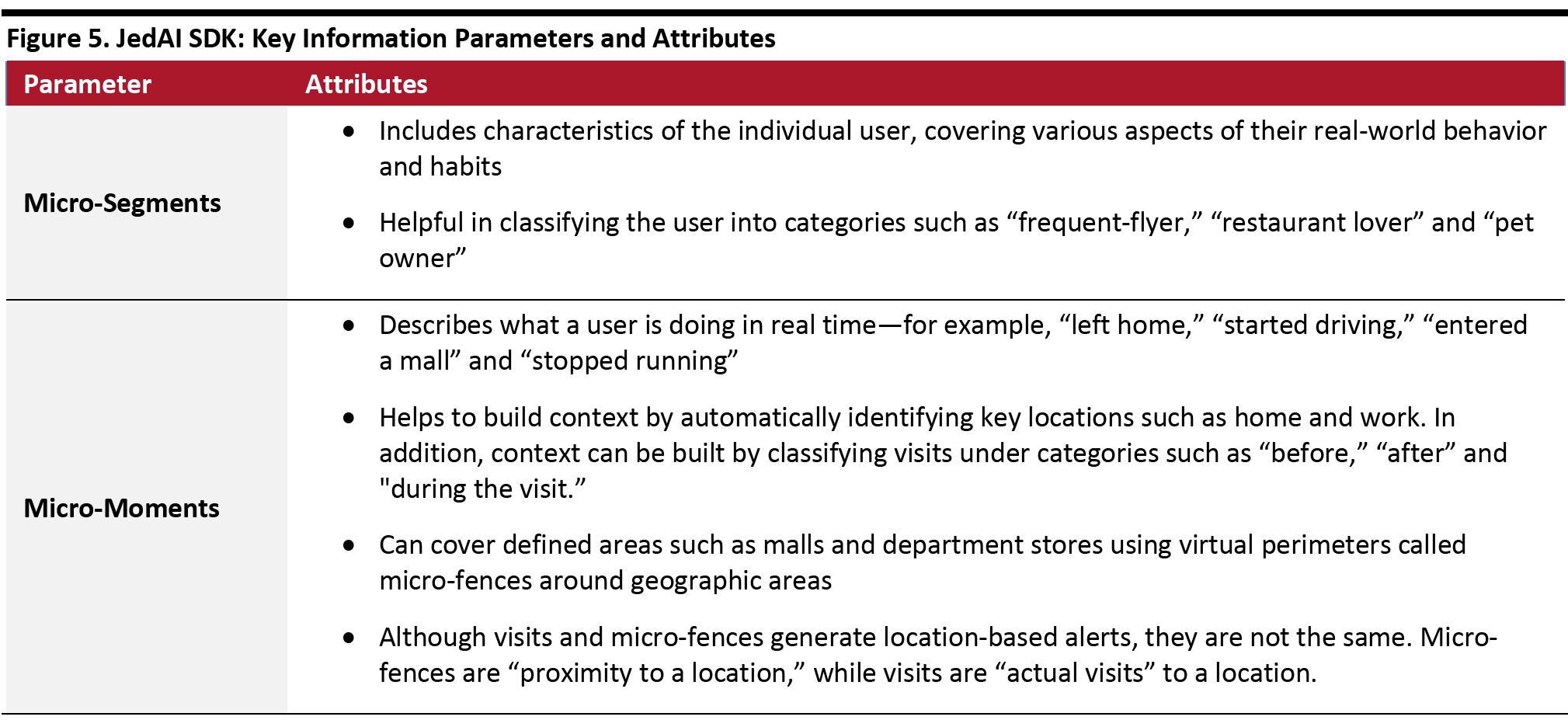 Source: Company reports/Coresight Research[/caption]
Anagog’s JedAI collects all personal information related to a consumer on the smartphone and facilitates the accurate segmentation of that individual based on attributes. Micro-segments and micro-moments then enable marketers to leverage contextual information to promote relevant campaigns in real time, thus ensuring higher efficacy of their promotions.
JEMA is responsible for the execution of these hyper-personalized and contextualized end-user campaigns on consumers’ mobile devices. JEMA is an out-of-the-box solution that integrates with JedAI and leverages micro-segments and micro-moments to identify the right instances to send a campaign to the end-user.
When designing a marketing campaign, the marketer needs to define “rules”—attributes based on which a user receives marketing notifications. For example, a rule called “fitness enthusiast” can be created to identify a user who runs every day and is currently entering a department store. In this example, smartphone users whose profile data shows they run every day (micro-segment) will be notified about relevant and personalized store offers when the phone identifies in real time that they have entered the designated store (micro-moment): Each offer is only presented when the user meets the conditions specified under the pre-defined trigger, and they can be in the form of a push notification, in-app banner, e-mail or text message on the end-user’s smartphone, to name a few. We illustrate a sample function of Anagog’s personalized and contextualized trigger in Figure 6.
JEMA campaigns can be defined and managed by clients through a simple-to-operate, front-end, web-based dashboard
[caption id="attachment_105333" align="aligncenter" width="700"]
Source: Company reports/Coresight Research[/caption]
Anagog’s JedAI collects all personal information related to a consumer on the smartphone and facilitates the accurate segmentation of that individual based on attributes. Micro-segments and micro-moments then enable marketers to leverage contextual information to promote relevant campaigns in real time, thus ensuring higher efficacy of their promotions.
JEMA is responsible for the execution of these hyper-personalized and contextualized end-user campaigns on consumers’ mobile devices. JEMA is an out-of-the-box solution that integrates with JedAI and leverages micro-segments and micro-moments to identify the right instances to send a campaign to the end-user.
When designing a marketing campaign, the marketer needs to define “rules”—attributes based on which a user receives marketing notifications. For example, a rule called “fitness enthusiast” can be created to identify a user who runs every day and is currently entering a department store. In this example, smartphone users whose profile data shows they run every day (micro-segment) will be notified about relevant and personalized store offers when the phone identifies in real time that they have entered the designated store (micro-moment): Each offer is only presented when the user meets the conditions specified under the pre-defined trigger, and they can be in the form of a push notification, in-app banner, e-mail or text message on the end-user’s smartphone, to name a few. We illustrate a sample function of Anagog’s personalized and contextualized trigger in Figure 6.
JEMA campaigns can be defined and managed by clients through a simple-to-operate, front-end, web-based dashboard
[caption id="attachment_105333" align="aligncenter" width="700"]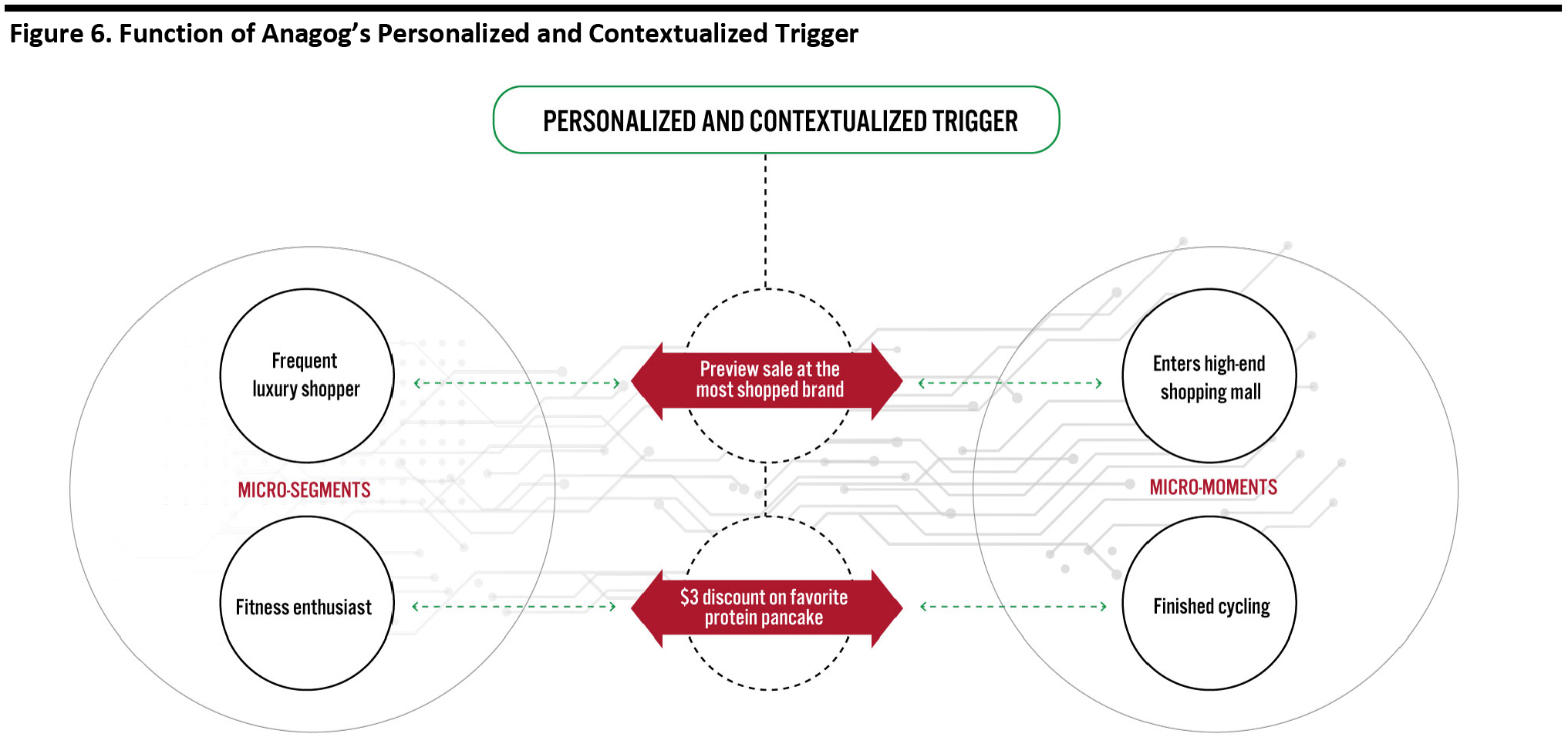 Source: Anagog/Coresight Research[/caption]
With JedAI, the user profile is stored only on the smartphone, rather than transferred to the cloud. A campaign is defined in the JEMA tool in the cloud and distributed anonymously to all relevant smartphones. Through this structure, the phones lie at the center of decision-making process in what to pull from the cloud and when. Anagog refers to this as a transition from “push” to “pull,” as personalized notifications are pulled from the cloud by the phone based on set criteria met by a user profile. Other solutions require personal information to be stored in the cloud, in order to enable personalized notifications to be “pushed” to consumer devices. This transition is shown in Figure 7.
[caption id="attachment_105334" align="aligncenter" width="700"]
Source: Anagog/Coresight Research[/caption]
With JedAI, the user profile is stored only on the smartphone, rather than transferred to the cloud. A campaign is defined in the JEMA tool in the cloud and distributed anonymously to all relevant smartphones. Through this structure, the phones lie at the center of decision-making process in what to pull from the cloud and when. Anagog refers to this as a transition from “push” to “pull,” as personalized notifications are pulled from the cloud by the phone based on set criteria met by a user profile. Other solutions require personal information to be stored in the cloud, in order to enable personalized notifications to be “pushed” to consumer devices. This transition is shown in Figure 7.
[caption id="attachment_105334" align="aligncenter" width="700"]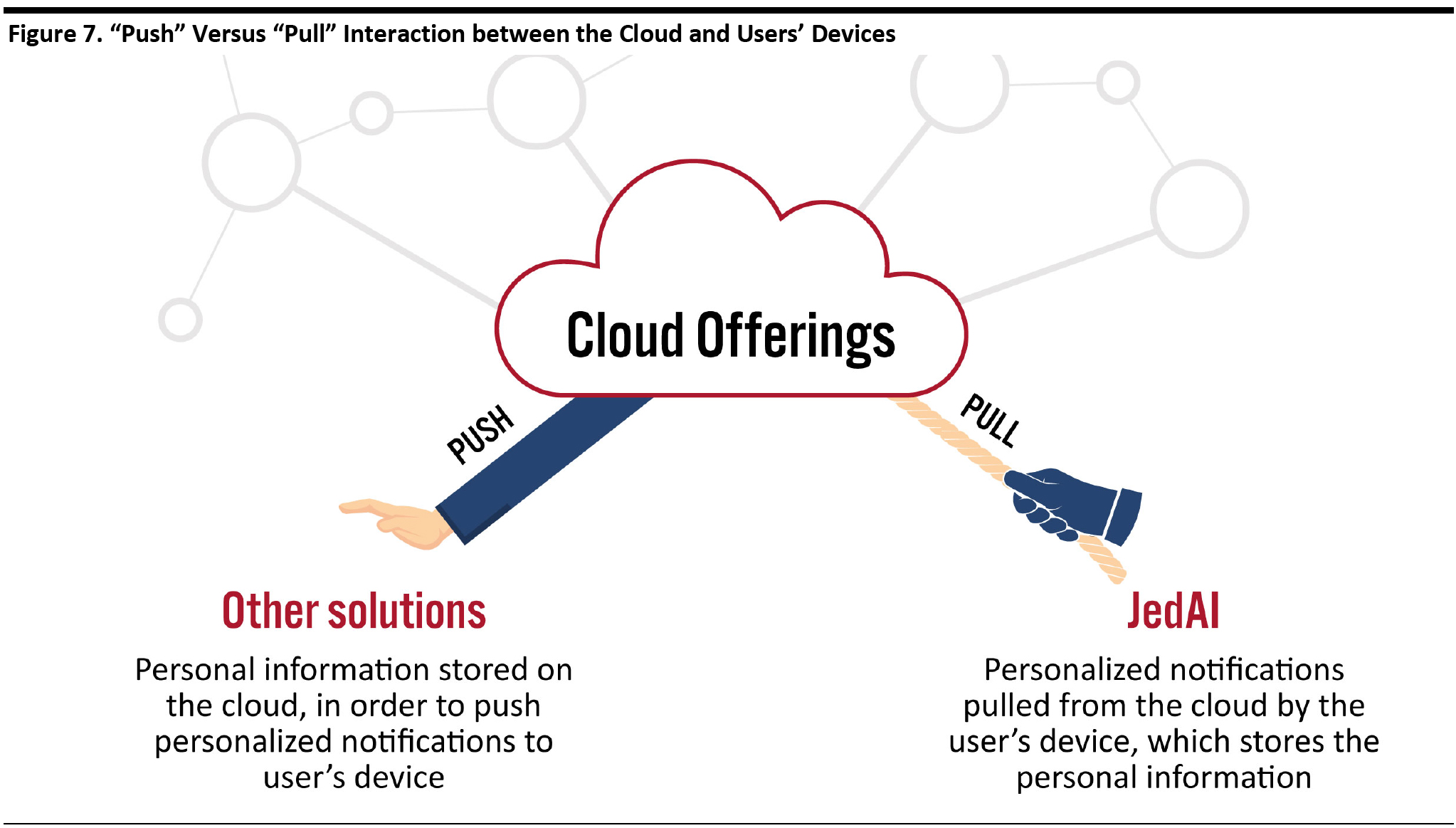 Source: Anagog/Coresight Research [/caption]
Source: Anagog/Coresight Research [/caption]
Anagog: Market Positioning
In this section, we analyze Anagog’s market positioning, current market opportunities, growth drivers and the company’s unique attributes. First, we identify some of Anagog’s key competitive advantages below:- Insights into customer’s offline behavior: Anagog’s technology can gather insights about each consumer’s real-world behavior by identifying their habits and offline activity, for example. With this approach, Anagog’s personalization offering provides accurate, actionable insights to clients.
- Data privacy: Anagog leverages its patented technology that ensures personal information is stored and analyzed by the user’s device, facilitating personalization opportunities without needing to send consumers’ private information to the cloud.
- Real-time insights: Anagog’s JedAI captures user activity in real time. Using this data to inform JEMA marketing rules, marketers’ contextual notifications are displayed to end-users at exactly at the right time, without lag, thus increasing the effectiveness of campaigns.
- Predictive capabilities: Anagog’s personalization offering builds consumer insights based on their behavioral data. Using personal information stored on a smartphone, JedAI can predict the next steps in a shopper’s journey.
- Increased likelihood of obtaining consumer consent: Anagog’s on-device AI engine allows smartphone users to decide if, and how much, personal information they want to share. This establishes high transparency and thus increases trust among consumers—making them more likely to grant the relevant permissions to share their personal data.
- Low battery consumption: Anagog’s Edge-AI has a minor effect on battery consumption—less than 1% per day on average. This is important because high battery consumption can result in customers uninstalling the application.
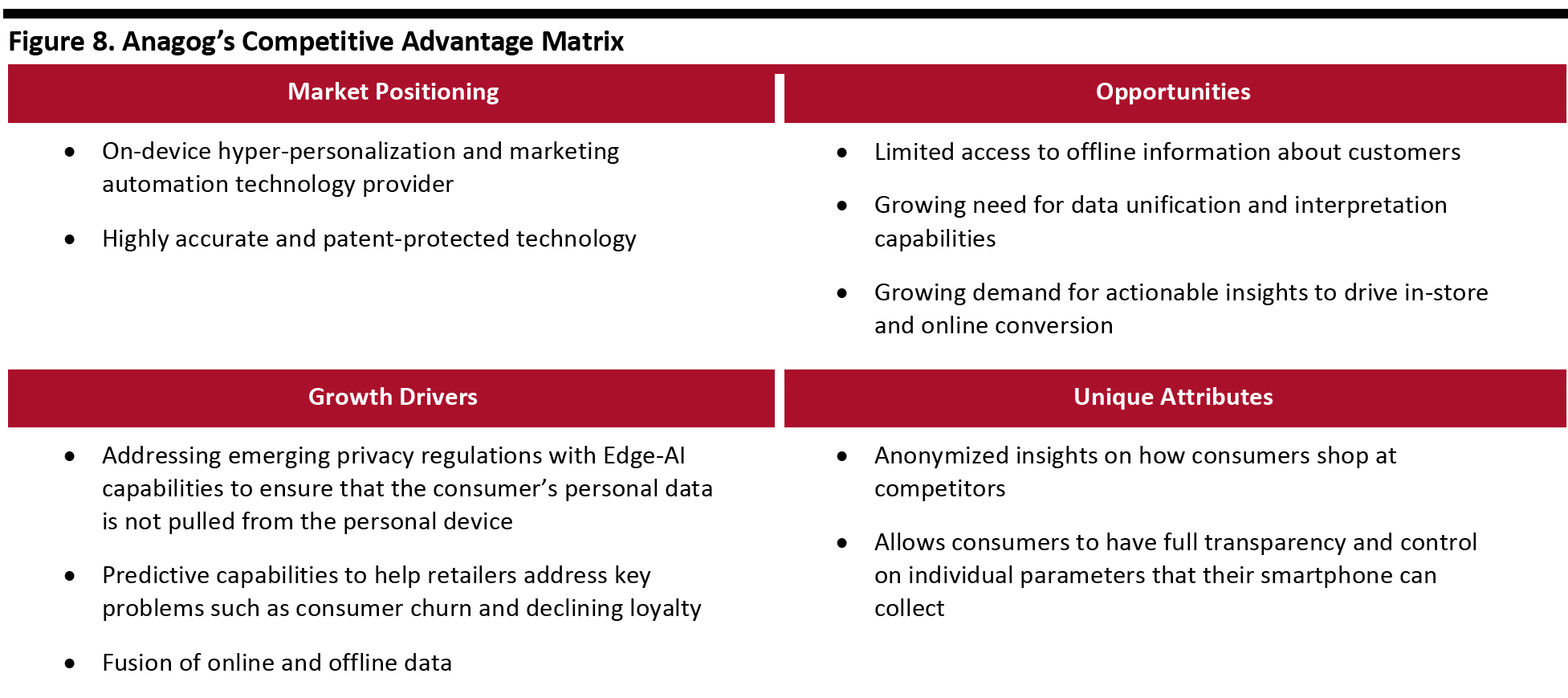 Source: Coresight Research[/caption]
Source: Coresight Research[/caption]
Anagog: Business Model
Anagog offers its JedAI suite of products under a licensing model per active user/month. The company is now expanding its offering by including on-device marketing automation software JEMA. The new software is an end-to-end solution that will be available for immediate deployment. It can be implemented in the following ways:- JEMA integrated solution: Integrates with existing marketing automation solutions to offer the enhanced offline hyper-personalization and contextualization
- JEMA standalone solution: Local campaign builder solution to allow marketers to create and implement immediate campaigns for mobile apps